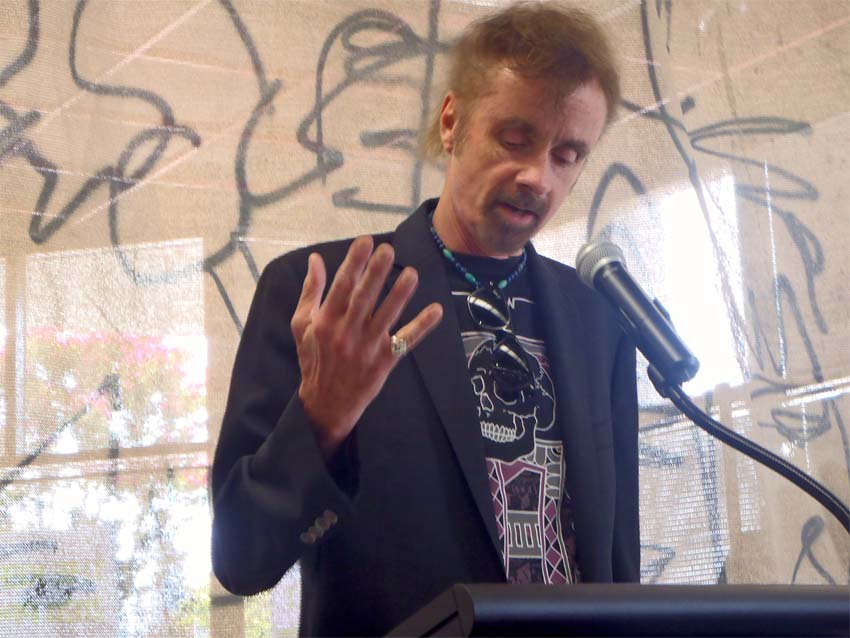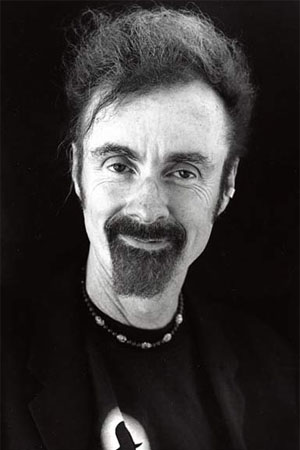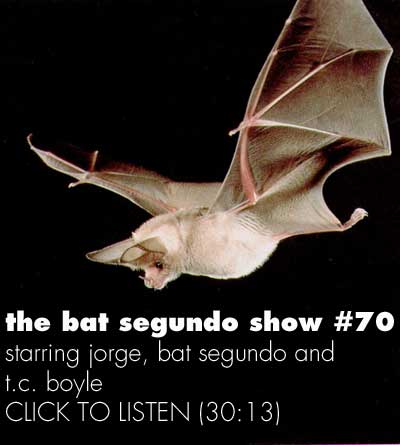T.C. Boyle is most recently the author of San Miguel.
Listen: Play in new window | Download
Since Mr. Boyle has appeared four previous times on this program (Show #10, Show #70, Show #273, Show #385), we felt that it was essential to include him in Bat Segundo’s last stretch. This is the fifth and final conversation with T.C. Boyle.
Condition of Mr. Segundo: Remembering his disastrous Diana-themed wedding ceremony to Doris.
Author: T.C. Boyle
Subjects Discussed: On being alive, the “Swiss Family Lester” article in Life, the advantages of working with scant details, not wishing to violate historical rules, Philip Roth’s The Plot Against America, the quest for quotidian atmosphere on an island, constant description of the wind, imagining what it’s like to live away from everyone as a fantasy, visits to the Channel Islands, rough seas, Boyle’s ineptitude as a sailor, the mysterious rangers who live on San Miguel Island, people who camp on the Channel Islands, why anyone would want to lay down $10,000 on a questionable capitalistic venture, comparisons between East is East and San Miguel, underplayed racial tension in San Miguel, Japanese fishermen who visited the Channel Islands, muting the irony, working within deliberate limitations, writing about a location that is starved of art and culture, staying original and avoiding the tendency to repeat, “Birnam Wood,” writing realistic stories without irony, Boyle’s tendency to use women as characters despite his efforts to write about men, carryover from Talk Talk and When the Killing’s Done into San Miguel, using character more as a writer, how Boyle’s stories have changed in the last fifteen years, the forthcoming Stories Volume II, John Updike, refusing to make adjustments to stories, “This Monkey, My Back,” the Ransom archives, academic methods of cleaning the house, the difficulties of giving up elements of the past, letters that Boyle didn’t give to Ransom, the morality of burning love letters, hiding financial disclosure, seeing writers of the past on TV and radio, George Bernard Shaw, Boyle’s insistence that society won’t exist in 100 years, Jack Kerouac’s disastrous appearance on Firing Line, whether author appearances and legacy even matters, the desire for literary gossip, literary biography, Carol Sklenicka’s biography of Raymond Carver, Blake Bailey, Alan Hollinghurst’s The Stranger’s Child, San Miguel as the obverse experience from Boyle typically playing joyful god towards characters, keeping San Miguel confined to the island, human efforts to control nature, despair, being a nature boy, having a sense of isolation, Thoreau living in nature, Alcatraz and Angel Island, writing fiction in isolation on a mountain, using the Internet with iron discipline, fiction which emerges from America in a glum economic and political state, Brian Francis Slattery’s Lost Everything, having a more muted view in advanced age, maintaining a clean conscience, the amniotic fluid of civilization, the addictiveness of handheld devices, the usefulness of smartphones, Occupy Wall Street, whether the experience of nature is lost on most people, biologists who have praised When the Killing’s Done, the recent shutdown of California parks, simulation as a way to confront reality, the 1935 film version of Mutiny on the Bounty shot at San Miguel, “The Monsters Are Due on Maple Street,” Lord of the Flies, Francophilia, language and civilization as a coping mechanism, spinsters, the surprising hope near the end of San Miguel, Boyle’s next novel about violence, deviation during a novel, how newspaper paragraphs turn into stories, and fiction vs. journalism.
EXCERPT FROM SHOW:
Correspondent: I found this [handing over printout] — this “Pictures to the Editor” article from Life. I thought that you were just making this up, this whole “Swiss Family Lester” thing. But lo and behold, I found this. And I’m sure you found this before you had the Life reporter show up in your book. And this leads me to wonder. Because I was surprised by how skimpy this article was. I mean, I look at these photos and there’s plenty of information there for a writer of your sort to draw and infer and so forth. So this leads me to wonder. How much research do you need for something along these lines? Is it helpful to not have as many details? Or to just have a picture like this?
Boyle: Yeah, I wonder. That’s a great question, Ed. The first section of the book about the Waters family allowed me a little more freedom to invent. Because the diary from which I was working was fifty pages or less. Very fragmentary and only took up a six month period. With the Lesters, since they were very well known and were featured in Life Magazine and on radio shows all across the country, it was a little more difficult. Because I didn’t want to violate the actual events of history. But I think the two stories, in my mind anyway, blended fairly well.
Correspondent: So if you have to go ahead and abide by the rules of history, as a fiction writer you have to invent. I mean, does this get in the way?
Boyle: Yes. Well, this is a question with any of the historical novels. And I’ve written many, many historical novels and stories too. You don’t have to abide. You can do, for instance, what Philip Roth did in The Plot Against America. You can change anything. There are no rules whatsoever. You can have aliens come in in the middle of a realistic story. But usually when I’m giving historical elements, I love the true story so much that I want to give it to you. And usually it’s so bizarre. Like for instance, Stanley McCormick from Riven Rock or Alfred Kinsey or even Frank Lloyd Wright. The people I’ve written about. In this case though, I was trying, as you know, for something totally different and, as a companion piece to When the Killing’s Done, to give more of an atmospheric, moody, quotidian kind of approach to what it might have been like to be someone living on this island solely.
Correspondent: But then you have situations like constant descriptions of the wind. There’s a lot of wind in this book. This leads me to ask, well, what do you do to keep that original? I know that you are devoted to original prose, original description, and not wanting to repeat yourself. What do you do to keep that fresh?
Boyle: Aw shucks, Ed. I’m just flying by the seat of my pants. Everything works organically. And if it’s windy, it’s windy. You know, the book begins — for those who don’t know — with a series of very short chapters. This is a naturalistic book about people living on an island. And each one introduces a new element. And one of those elements is the fog, for instance. One is the wind. Many of them describe elements of the house: arriving at the house, the kitchen, the bedroom. It’s a way of my going deep inside these characters to imagine what it would have been like to live apart from everyone. I mean, this is a fantasy that so many of us have. Why the Lesters were famous in their day. Simply for living apart from the entire world on this island, in sole possession of it, during the Depression. When everybody else was lined up on the streets looking for a job.
Correspondent: Did you make any visits to San Miguel? I know you did that for Anacapa for the last book. Did you take in the terrain to know how to write about it? Especially when there are really no remnants of the homes, the domiciles, or even the sheep that actually appeared over there.
Boyle: Indeed yes, Ed. I made a single trip to San Miguel. Now I’ve made many, many trips, of course, to Santa Cruz and Anacapa, which were the setting of the previous book. As you know from having read San Miguel, this island is the farthest out and the most buffeted by the weather because of the currents. It’s not protected by Point Conception. It’s right off of it. So it’s getting everything coming down from the northern current from San Francisco, rumbling with the southern current coming up from Los Angeles and San Diego and spinning around in the Santa Barbara Channel. So it’s very, very rough seas. I’m told that I write very well about the seas, particularly in When the Killing’s Done, which opens with a shipwreck, as you remember. But I’m not a good sailor and my stomach doesn’t like being at sea. Especially in rough seas. Now it’s an hour and a half across to Santa Cruz in rough seas. But it’s four hours to San Miguel. And once you get there, you must stay in a campground for several days before the boat will come back to pick you up. I used a very, very simple stratagem to avoid this. I flew out. I flew out with the ranger, who is the sole person who lives there in the sole building on the island.
Correspondent: Well, that’s not exactly cricket if you want to mimic the experience.
Boyle: Well, of course, I have had the experience of going across the Channel many, many times.
Correspondent: Those extra hours, Tom.
Boyle: It’s true. It’s true. I never actually hung my head over and vomited. But I’ve been close on several occasions. I should say too, when I went to visit the ranger, I brought my son with me. I brought Marla Daily, the local historian who turned me onto all of this and published these diaries. And it was wonderful. Because the ranger himself is a historian of the place. And so is she. So I got to spend a full day with them looking at the rafters that were left in the ground of the old Lester house. There’s just a few remnants left. A little midden of cans and stuff. And just really get a sense of all of these places I had read about. And distances. And to walk all the trails. But what most intrigued me was that as you fly in, the beaches there — you’ve seen it probably on Walt Disney and the Discovery Channel — it’s a huge breeding ground for the elephant seal. And you see them, hundreds of them, lying below you like giant inflated sausages. And as soon as I got off the plane, I said to Ian, “Look, maybe I should be talking to Fish and Game instead of you. But is it a violation if I mate with one of the sea elephants?” And he didn’t miss a beat. He said, “You know, that’s a violation on every possible grounds.”
Correspondent: How long did the ranger live there? I mean, did you get to know him fairly well to get a sense…
Boyle: Well, I spent a day with him. A day and a night with him. He has to retire. He’s only like fifty or something. But they rotate them out. And I think he has to retire soon. But he’s been there for some years. And he’s not there permanently. I mean, he has relief. Because even people who like solitude might go a little nuts out there.
Correspondent: Well, as you depict in your book.
Boyle: A further statistic. In Santa Cruz Island — the big one, four times bigger than Manhattan, right across from Santa Barbara, you can see it right there — there is a public campground. And you can take this boat out and you can camp there. And I was told by the ranger there that some days, like a July 4th weekend, there might be as many as 300 people camping in that campground. On San Miguel, there are 300 campers per year. So it’s pretty remote.
Correspondent: It is a park, I understand.
Boyle: It’s part of the National Park. Yeah. All the Channel Islands are, with the exception of Catalina.
Correspondent: So if the ranger gets rotated out, and if you are only relying upon a fifty page diary or scraps or, in the case of the third part, considerable media attention — although that’s accentuated by the fact that suddenly they have electricity, suddenly they have radio and so forth — what do you do to mimic that experience of being trapped on an island? Do you go ahead and spend a week eating nothing but lamb? How does this work?
Boyle: I’m just using my imagination, of course. Again, in this one as a companion piece for When the Killing’s Done, which is so vibrant and wild and deals with a current ethical concern about how we treat animals and who has the right to do it and who owns the turf, here I wanted something much more muted, to give a kind of experience of what it must have been like. Because this is a fantasy of everybody. One of the memoirs — the one by Elise, Elizabeth Lester — is called The King of San Miguel. Herbie was the king. Who else is the king? It’s just him, his wife, and two kids.
Correspondent: Who wants to be the king?
Boyle: That’s another question. Who wants to be the king? And I think what intrigued me about the first diary, Marantha, and then the Lester book is that there were these tremendous correspondences between the two families, who were in sole possession of this. One in the 1880s and the other in the 1930s. Here are men who have a vision and really don’t take into consideration the costs on their wives. I think this is particularly true in the first one: Marantha’s story. Here was a woman. Upper middle class. Living in an apartment in San Francisco. Convinced by her husband to buy into this ship ranch. To buy essentially this island and live there and, of course, they make their living in the most essential way. They shear the sheep and sell the wool. What could be simpler? A life in nature. But everyone isn’t suited for that.
(Image: Teri Carter)
The Bat Segundo Show #492: T.C. Boyle (Download MP3)




 Boyle: I try to get it both ways. I try to involve you in something in a satiric way. And yet it should also move you. And of course, in this book, I had to do that because of the tragedy of Mamah, which will conclude the book. So you have to set the reader up for that throughout. And I think there is tragedy throughout the book. Tadashi’s life is incredibly tragic in many, many regards. So again, I’m playing one element against the other throughout. And there is commentary upon commentary upon commentary. And, for me, it opened up the structure and it made it fun. It made it invigorating. A lot of the footnotes exist to give you information that I would like you to know about Frank Lloyd Wright and his buildings and where he was at any given time. But a lot of them also, I just express surprise on the part of Tadashi. And I find the hilarious.
Boyle: I try to get it both ways. I try to involve you in something in a satiric way. And yet it should also move you. And of course, in this book, I had to do that because of the tragedy of Mamah, which will conclude the book. So you have to set the reader up for that throughout. And I think there is tragedy throughout the book. Tadashi’s life is incredibly tragic in many, many regards. So again, I’m playing one element against the other throughout. And there is commentary upon commentary upon commentary. And, for me, it opened up the structure and it made it fun. It made it invigorating. A lot of the footnotes exist to give you information that I would like you to know about Frank Lloyd Wright and his buildings and where he was at any given time. But a lot of them also, I just express surprise on the part of Tadashi. And I find the hilarious.